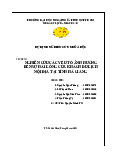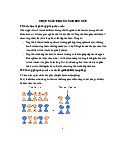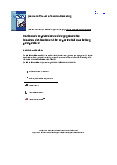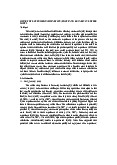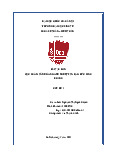


















Preview text:
System Requirement Specification
Security Classification: Confidential Approval Page Decision ☐ Approved Rejected ☐ Name: Signature/Date: Revision History 1 Date Version Author Change Description DD/MM/YYYY 0.1 Author First Creation 2 Table of Contents 1. Introduction 4 1.1 Purpose 4 1.2 Glossary and Abbreviations 5 1.3 Document Referenced 6 2. High Level Requirements 7 2.1
High Level Business Process (SWIMLANE DIAGRAM) 7 2.2 Entity Relationship Diagram 8 2.3 Use Case Diagram 9 2.4 Actor 0 2.5 Use Case Catalogue 0 2.6 Site Map (Optional) 0 3. Use Case Specifications 1 3.1 UC01 1 3.1.1 Overview. 1 3.1.2 Activity Flow (Optional) 1 3.1.3 Flow of Events 1 3.1.4 Mock-up Screen 2 3.1.5 Screen Description 2 3.1.6 Business Rules 2 3.2
UC2: Approve/Reject Approval Request 2 3.2.1 Overview 2 3.2.2 Flow of Events 3 3.2.3 Mock-up Screen 5 3.2.4 Screen Description 5 3.2.5 Business Rules 7 4. Appendices 8 4.1 Message List 8 4.2 Email List 8 3 4 1. INTRODUCTION 1.1 Purpose
The Software Requirement Specifications will:
❖ Define the scope of business objectives, business functions, and organizational units covered,
❖ Identify the business processes that the solution must facilitate,
❖ Facilitate a common understanding of what the functional requirements are for all parties involved,
❖ Establish a basis for defining the acceptance tests for the solution to confirm that what is delivered meets requirements.
The purpose of the document is to collect and analyse all assorted ideas that have come up to define the system,
its requirements with respect to consumers. Also, we shall predict and sort out how we hope this product will be
used in order to gain a better understanding of the project, outline concepts that may be developed later, and
document ideas that are being considered, but may be discarded as the product develops. 5 1.2 ThaGlossary and Abbreviations Acronym Reference SRS
System Requirement Specification UC Use Case BR Business Rules CBR Common Business Rules ET Email Template N/A
Not Applicable or Not Available MSG Message [Field]
Convention for mentioning a field <>
Convention for value of this field, specifically use in the context of Email Template “Text Value”
Convention for mentioning a value
Convention for mentioning special value, i.e. , TBU To be Updated NRF National Research Foundation OOE Other Operating Expenditure N/A Not Available 6 1.3 Document Referenced Attachment Document Name / Title High Level Requirement Slide High Level Wireframes 7 2. HIGH LEVEL REQUIREMENTS
This section describes the general overview of the system functions or business processes which are depicted in
different diagrams. It shows the types of users, their granted permissions to perform specific system functions and
the sequence required to complete a business workflow (if any). As the section name implies, it is high-level which
means not detailed enough. For detailed requirement specification, please see Use Case Specifications section below. 2.1 High Level Business Process 8 2.2 Entity Relationship Diagram 9
